
Vitaly
Want to move to Israel under the Law of Return? This article has everything you need to know: who is eligible, what documents to gather, how the consulate interview works, and what to do after you arrive. We'll tell you how to obtain citizenship, housing, government assistance, work, and education.
Repatriates in Israel are people of Jewish origin and their family members who return to Israel as the land of their ancestors and obtain citizenship under the Law of Return. This is not about labour migration or refugee status, but specifically about the right of return based on Jewish origin or conversion to Judaism.
The issue of repatriation has become particularly significant since the events of 2022. Many Jews living in Russia began to actively exercise their right to move to Israel. According to the Jewish Agency, in 2022 alone, the number of repatriates from Russia exceeded 32 900 people. This became one of the most notable migration flows in recent decades, which only confirms the relevance of the programme and its demand. In 2023, the numbers were even higher – over 45 000 new citizens, of whom about 70% were from former Soviet countries. This trend can be explained both by the political situation and by people's desire to be closer to their Jewish roots and take advantage of Israel's support for new citizens.
Why is it worth understanding the repatriation process? Firstly, it is a complex bureaucratic procedure with many stages and nuances. Secondly, knowing all the details will help you avoid mistakes when moving and adapt more quickly.
The answer lies in the main legal basis for aliyah – the State of Israel's «Law of Return» of 1950. It stipulates that repatriation is permitted for all Jews and their immediate descendants. Thus, the following persons have the right to aliyah:
It is important to note the exceptions. If a person born Jewish voluntarily converts to another faith, they lose their right to repatriation. The same applies to his family: for example, if you are a descendant of a Jew but were baptised into another religion, the Israeli authorities will deny you citizenship. The State of Israel provides refuge to all Jews, but reserves the right to decide who can't make aliyah. Article 2 of the Repatriation Act gives the government the power to refuse repatriation to people who pose a threat to national security or public health. This rule usually applies to criminals and terrorists, but there have been cases of refusal on health grounds (for example, in cases of serious infectious diseases or severe mental illness that could pose a threat to others). We will discuss such cases in more detail below.
At the beginning of 2022, amid a wave of mass returns, the Israeli authorities introduced a special procedure — emergency repatriation. This temporary programme allowed for accelerated aliyah, with the main verification of citizenship rights being carried out on Israeli territory. People could fly in on a tourist visa, and their documents were checked right at the airport.
In April 2023, the “aliyah ASAP” programme was officially discontinued. From this point onwards, the return process will once again be carried out exclusively according to the standard procedure. The fast-track procedure is no longer available to citizens of the Russian Federation. The only exception for 2025 remains Jewish immigrants from Ukraine, who can take advantage of a simplified procedure due to circumstances of forced emigration. Other candidates for repatriation must follow the usual procedure for submitting documents and undergoing checks.
The State of Israel strives to ensure that new citizens do not simply move there, but fully integrate into society. To this end, special repatriation programmes are being launched, aimed at the rapid and effective integration of immigrants into the education system and the labour market. In 2025, dozens of different state and semi-state projects are available to help new citizens.
The options listed above are only a small part of the broad support system for new repatriates. In reality, there are many more such programmes, and new initiatives appear every year. Proper use of these opportunities can greatly facilitate integration: obtaining relevant education, improving qualifications, or finding a job that is in demand on the Israeli market.
There is no standardised, strictly defined list of documents required to obtain a repatriate visa — each case is considered individually. However, experience has shown which documents are most often requested by consulates when considering applications.
Here is a tentative list of documents that we recommend you gather:
Information about relatives in Israel. This information plays an important role in the consideration of the case, especially if the relatives have Israeli citizenship or repatriate status. It is recommended to prepare information about such family members in advance: their full names, addresses, telephone numbers, and, if possible, identity card numbers (teudat zehut). This information is entered into the applicant's personal file and can be used as additional confirmation of ties to Israel.
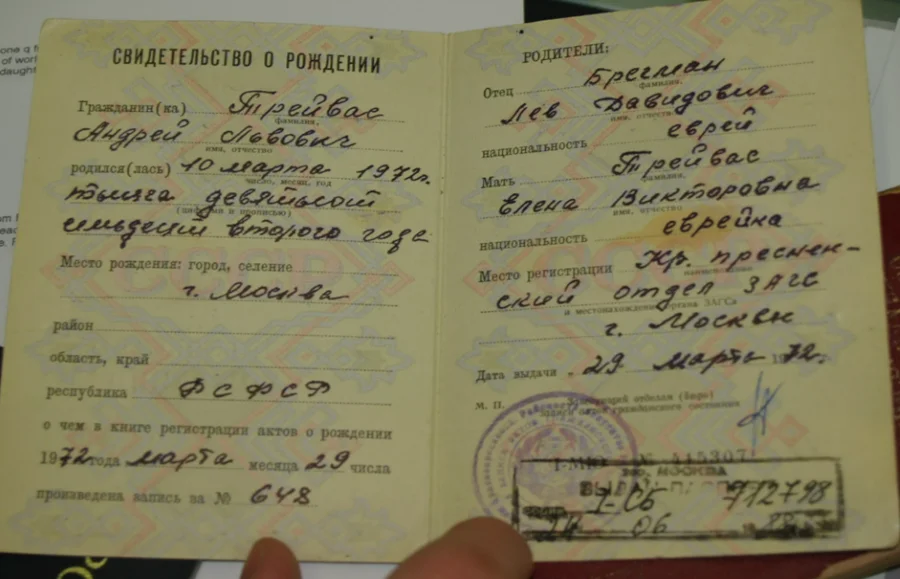
Example of a birth certificate indicating the nationalities of the father and mother as “Jewish”
Remember, the list is subject to change. The main thing is to confirm your Jewish ancestry and provide personal documents. It is better to bring more papers than to forget something important: the consul has the right to ask for additional evidence if he or she has any doubts. It is also worth preparing copies of all the listed documents in advance.
If you find it difficult to conduct an archive search on your own, you can contact specialists who will handle your request professionally. However, in the end, you will need to submit the entire package of documents in person at an interview with the consul.
The aliyah process consists of several stages, each of which is important. The repatriation procedure itself includes preparing documents, consular verification, issuing visas, flying, and registering citizenship status once you arrive. Next, we will examine these stages in detail.
Step 1. Submitting an official application. Previously, to begin the aliyah process, one had to make an appointment at the Israeli consulate by sending an email. Since 9 January 2023, the process has become much simpler: applications are now submitted entirely online. All you need to do is go to the official website of the Native service and fill out an electronic form. This means that you can start the repatriation process remotely, without having to visit the consulate in advance or engage in unnecessary correspondence.
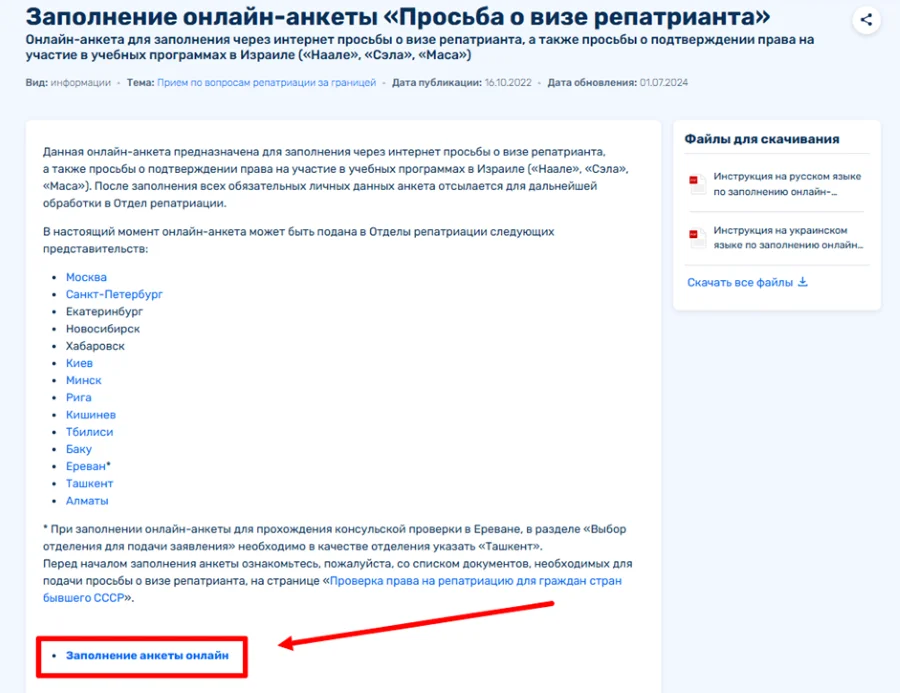
The “Fill out the questionnaire online” button on the Native website
You need to register on the portal and carefully enter all your personal and family details there.
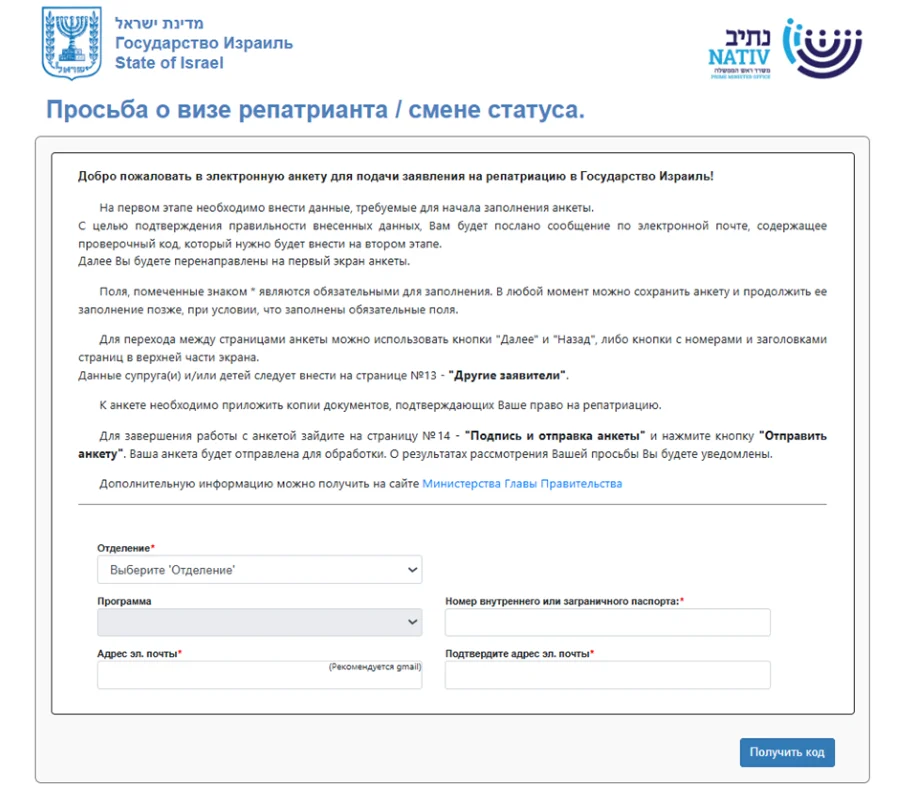
The first window of the electronic form for submitting an application for repatriation to the State of Israel
The application is quite long – about 40 pages of questions, so please fill it out carefully and avoid mistakes. If you have any doubts, you can consult with specialists, but in general, many people successfully complete it on their own. You can use the instructions in Russian for filling out the online questionnaire in PDF-format.
At the end of the questionnaire, you will be asked to select the city where you would like to be interviewed by a representative of the Israeli consulate — usually Moscow, St. Petersburg, or other major cities. Once you have made your selection, the questionnaire will be sent for review.
Step 2. Verification at the consulate. In the next stage, employees of Israel's repatriation department analyse the information and documents you have submitted. If the application is completed correctly and is pre-approved, you will be contacted by email or telephone to schedule a personal interview.
The repatriation process does not always go smoothly: it can be accompanied by legal complications and bureaucratic peculiarities. One such risk is rejection at the consular stage — this occurs if the consul concludes that the applicant does not meet the requirements of the Return Act.
If you get rejected, don't get discouraged. Many decisions can be changed.
If the reason is a lack of documents, try to find them and try again. If the problem is the consulate's doubts, you can reapply and prove the seriousness of your intentions, especially with support from Israel (for example, a letter from relatives in the Israeli community).
If the refusal is based on a categorical provision of the law (fourth generation, different faith, serious crimes), then, unfortunately, there is no way back. In such cases, there is indeed no right to repatriation, and neither appeals nor courts will help. For example, the great-grandson of a Jew has only one option: to undergo giyur himself, become religiously Jewish, and then apply for citizenship (but this is a completely different process).
If your application is rejected, it would be wise to consult a lawyer who specialises in Israeli immigration. Who can you turn to for help? There are many companies and private specialists who are ready to assist repatriates. They will advise you on how to competently gather new evidence, prepare you for a second interview, and, in controversial cases, help you file an appeal with the Israeli Ministry of the Interior. However, paid services are voluntary. You can go through the entire procedure on your own, using open sources of information and recommendations from the Jewish Agency.
The interview with an officer from the repatriation department at the Israeli embassy is conducted in person. The entire family must be present — all applicants, including spouses and children of any age, are required to appear in person. On the appointed date, you must arrive at the consulate with the originals of all the prepared documents.
The authorised officer (commonly referred to as a consul) reviews the materials provided, asks clarifying questions, and, based on the results of the interview, decides whether you and your family members meet the criteria established by the Return Act.
An interview with the consul is not an exam on your knowledge of Israeli history, as some people think. It is a confidential conversation aimed at establishing your connection to the Jewish people and the seriousness of your plans. The officer may ask questions in any order, often jumping from topic to topic.
Some common issues faced by repatriates:
The interview usually lasts 20-30 minutes, but it can be longer if the case is complex. After the interview, the consul either announces the decision immediately or says that additional time is needed to check the documents. In any case, you will find out the final verdict: if you are eligible for repatriation, you can proceed with the visa application process. If not, you will receive a written refusal stating the reason.
When the consular check is over and the officer says the cherished words, "Masal tov, you are approved!", the next stage begins – the issuance of a repatriation visa.
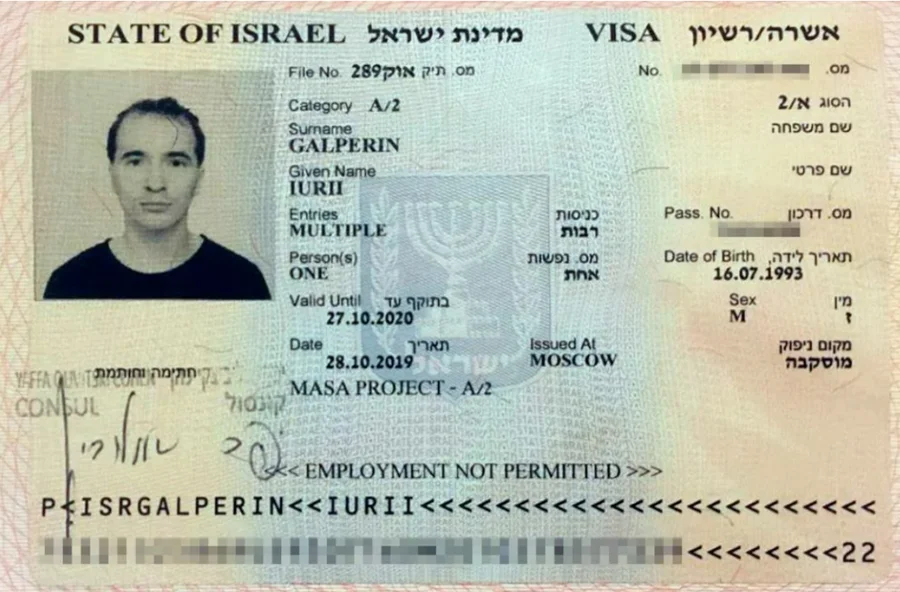
Repatriate visa
Each family member receives an “Alef ” (Olim) immigration visa in their foreign passport, which allows them to enter the country. It takes several days to process the visa after the interview. It is valid for six months, during which time the family must relocate and begin the citizenship application process.
Important: repatriate visas are issued completely free of charge — unlike tourist visas, there is no fee for processing alie documents.
Since 2025, due to the suspension of the activities of the “Sochnut” agency in the Russian Federation, flights have been organised through an official authorised partner — MAROM LLC. It is this organisation that currently coordinates all logistical issues related to repatriation from Russia.
There are no more free charters: “Marom” only advises on the choice of commercial routes (most often with a transfer), helps with documents for additional baggage, but each repatriate pays for the ticket themselves. Part of the expenses can only be reimbursed after arrival by submitting receipts to the Ministry of Absorption in Israel.
The Israeli side will also take care of your departure and meeting you at the airport. After obtaining your visas, you will receive instructions on where to report your arrival date and flight so that you can be included in the lists of arriving repatriates.
Upon arrival at Ben Gurion Airport in Tel Aviv, you will immediately feel the care of your host country. New immigrants are met at the airport by representatives of the Ministry of Aliyah and Integration. Instead of going through general passport control, they are taken to a special hall for olim hadash, where they are congratulated and helped to complete their initial paperwork. Each family member is immediately issued with a temporary repatriate certificate – Teudat Ole – and assigned a personal identification number (Teudat Zeut), which will become your main ID in Israel. From this moment on, you are already citizens of the country.
The first tranche of the absorption basket is also issued there: several thousand shekels per family in cash or on a card. These funds are intended for priority expenses in the first few days — food, transport, basic household needs — until the start of subsequent monthly payments for six months.
After completing all formalities at the airport, repatriates are sent to temporary accommodation. If you have relatives or friends in Israel, you will most likely go to stay with them. If you don’t have accommodation, the state will provide temporary accommodation. This is usually either an absorption centre (merkaz klita) – something like a hostel – or a hotel, paid for the first few weeks. At the absorption centre, you will be given a furnished room or a small flat where you can live for several months for a nominal fee.
Each new immigrant is also assigned a curator – a municipal employee or volunteer who speaks Russian. They will meet you, help you get to your city, and advise you on how to deal with immediate issues (filling out paperwork, connecting your phone, buying groceries, etc.).
In the days immediately following your arrival, you will have a lot to do. But at this very first moment, the main thing is to rest from your journey and settle in. The Israeli Integration Authority usually conducts a short introductory tour: they will show you the nearest bank, post office, supermarket, and introduce you to other repatriate families who live nearby. The first few days can be stressful (new country, language, time zones), but remember: you are not alone. You are surrounded by other new citizens, and the state will try to make your start as comfortable as possible.
When the whole family is planning to move, even more questions arise. Repatriation with minor children has its own nuances.
Firstly, repatriation as a family is only possible if the children are under 18 years of age. Adult children must apply separately as independent applicants (or they can move on other grounds, such as study). Minors are included in their parents' application and receive citizenship together with them.
Secondly, the principle of generations is important: the children of a repatriate are considered to be one generation further removed from their Jewish ancestor than the repatriate himself. For example, if you are the grandson of a Jew (i.e. 3rd generation), then your child is already the great-grandson of a Jew (4th generation). The law does not grant citizenship to great-grandchildren of Jews over the age of 18, but if the great-grandson is still a child, he is included in his parent's case and becomes a citizen provided he moves before reaching the age of majority. However, there is a subtle point here: such a child will receive status, but in order to retain it, they must live in Israel for at least three years before reaching the age of 18. Simply put, if your son or daughter is a fourth-generation descendant, it is better to repatriate at least three to four years before they turn 18. Then, by the time they reach adulthood, the child will already be integrated, and no restrictions will prevent them from remaining a citizen. If you delay and arrive with a 17-year-old great-grandchild of a Jew, there is a risk that after a year their status will not be extended (the so-called “3-year residence rule”).
Another feature is the consent of the other parent. If the mother or father is repatriating with the child, and the other parent remains abroad, it is necessary to have their consent for the child's departure notarised, as we mentioned earlier. The Israeli authorities are very careful about the removal of children to prevent cases of illegal border crossing by one of the parents. Without such consent, the case will not even be considered.
Also prepare your children for the consular interview. The consul may ask a school-aged child a couple of questions, such as whether they know anything about Israel and whether they want to move there. It is advisable to explain to your child in advance where you are going and why, so that they are not confused during the interview. There have been cases where teenagers, when asked by a consular officer if they want to go to Israel, shrugged their shoulders or said “I don't know.” This makes a bad impression. Therefore, talk to your children at home: tell them about Israel, emphasise that the decision was made by the whole family and that new opportunities will open up for them there.
All children must be present at the interview in person, including toddlers and infants. Failure to bring a child to the interview will result in immediate refusal. Children under the age of 18 are included in their parents' visas and travel with them.
There are advantages for children after arriving in the country. They tend to adapt faster than adults. Schools in Israel offer special programmes for students – including additional Hebrew lessons and help with educational materials. Your child will most likely master the language better than you in a year.
The state allocates funds for each repatriated schoolchild: schools have "ולה"classes (ulpan for pupils), where new immigrants learn the language and subjects, catching up with the curriculum.
Children are also entitled to benefits: for example, free meals during extended school hours, discounts on school trips and extracurricular activities, and additional scholarships. Parents should not worry about education – the Israeli system is adept at working with children from different countries.
If you have a young child (of nursery age), they are also entitled to support. Absorption centres often have free children's rooms where teachers look after the little ones while their parents sort out everyday issues. Later, when you have settled in, your child will go to a state nursery – repatriates can receive a subsidy to pay for nursery fees for the first year.
So, here are some key tips for families: take your children with you every step of the way, prepare their documents, and get them mentally prepared for the move. Repatriation as a family is a double responsibility, but also double the joy, because it's easier to settle in together. Israel values new families and creates conditions for them to start life with a clean slate.
Once you have obtained the status of a new repatriate and crossed the threshold of your Israeli home for the first time, you will surely ask yourself: "What next?" After repatriation, an equally important stage begins – integration into Israeli society. Let's take a look at the main steps you need to take after arrival in order to finalise all the paperwork and exercise your rights.
After settling in, the first thing to do is visit the Ministry of Internal Affairs office in your area of residence. There, you will be issued with a permanent identity card – Teudat Zeut (plastic ID card) – to replace your temporary form.
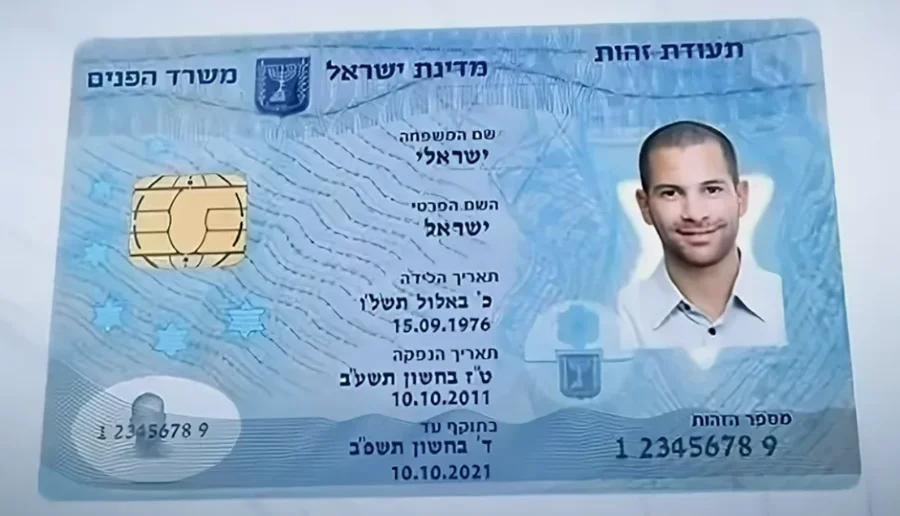
Permanent identity card Teudat Zeut (plastic ID card)
Immediately after obtaining citizenship, you can apply to the Ministry of Internal Affairs for a foreign passport. In the first year, repatriates are usually issued with a temporary travel document, Lesse Passee, valid for one or five years, rather than a full biometric Darkon passport. This document allows you to travel abroad, but the list of countries you can visit without a visa is limited (in particular, you will need to apply for a visa in advance to visit the United States).
A full biometric Darkon is available after one year of permanent residence, provided that you have spent at least nine months in Israel during the first 12 months. To obtain a Lesse Passee, simply visit the Ministry of Internal Affairs office, fill out a form, and your temporary passport will be ready in a few weeks.
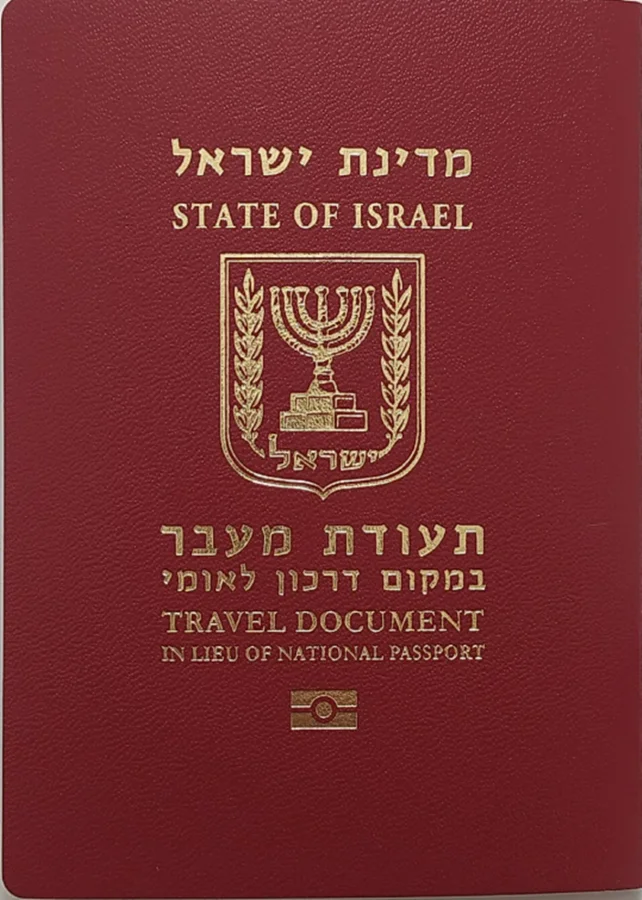
Temporary travel document Lesse-Passe
Register with the health service. You need to take a form from one of the health funds (Clalit, Maccabi, Leumit or Meuhedet) to the nearest office of your chosen fund, after which you will become their client. New immigrants are provided with subsidised health insurance: if you do not have a job, the state will pay your health insurance contributions for the first few months. But even if you are hired on your first day, be sure to join a health fund – this will entitle you to free basic medical services. Later, you will be issued with a magnetic insurance card, and you will be able to register with a polyclinic in your place of residence.
The next step is to open a bank account. Without an account, you will not be able to receive benefits, salaries, or function normally in the economy. To open an account, you need a teudat zeut (ID card) and a teudat ole (repatriate certificate). Take these documents to any bank (initially, we recommend the state-owned Bank Apollim or Leumi, as they have special programmes for new immigrants). The bank will help you fill out the forms – there may even be a Russian-speaking manager. After opening an account, provide its details to the Ministry of Absorption so that the remaining payments from the absorption basket are transferred directly to your account.
Also, replace your driving licence if you plan to drive a car. Russian licences are valid in Israel for only one year, after which you will need an Israeli licence. There is a simplified replacement procedure for repatriates: during the first year, you can exchange your foreign licence without completing the full training course – you will need a medical certificate, several driving lessons and one exam. It is best not to delay: as soon as you settle in, sign up for a consultation at a driving school about exchanging your licence.
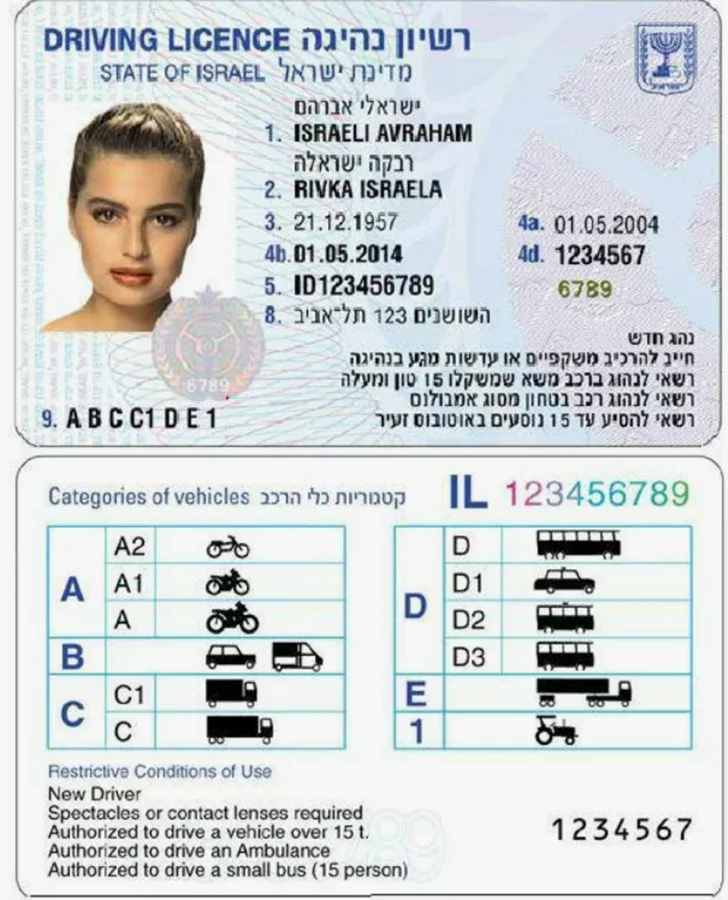
Israeli driving licence
Israeli citizenship is automatically granted to you when you cross the border on an immigration visa. Unlike many other countries, there is no solemn oath or separate naturalisation ceremony: the Law of Return applies directly, without additional formalities or conditions.
Nevertheless, an important step symbolising the completion of bureaucratic procedures is the issuance of an Israeli citizen's foreign passport, known as a Darkon. You can apply for one after 12 months of permanent residence in the country. To do so, you need to contact the Ministry of Internal Affairs office and undergo an interview. If everything is in order, you will be issued with a biometric Darkon valid for 5 years. After this period, you can renew your passport for 10 years — on the same basis as a fully integrated citizen.
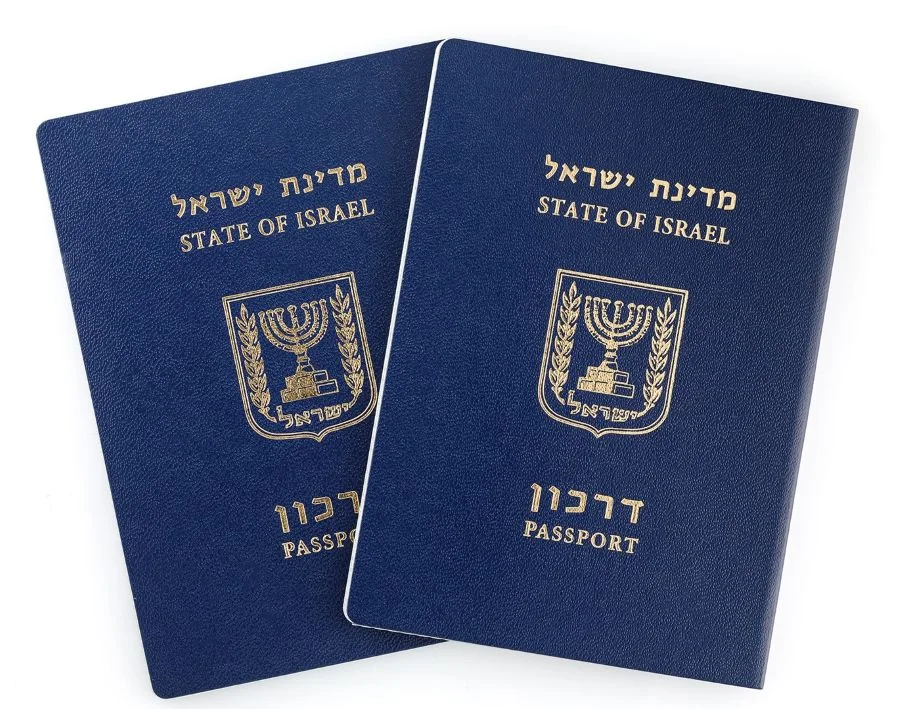
Darkon - Israeli foreign passport
It should be emphasised that obtaining Israeli citizenship doesn’t require renouncing one's previous citizenship. Repatriates have the right to retain the citizenship of their country of origin, and in particular, their Russian passport. Israel recognises the possibility of multiple citizenship and does not require the cancellation of previous citizenship.
This is a standard procedure, but there are some nuances. Israeli banks may initially impose restrictions on accounts held by new citizens from other countries (e.g., limits on withdrawals until there is a transaction history). You will be asked to indicate where your income will come from – say that initially it will be government benefits (absorption basket). The bank may ask for your foreign passport in addition to your Teudat Ze'ut to verify your identity.
Life hack: bring your repatriate certificate (teudat ole) with you when you open an account. Many banks offer special bonuses to new repatriates, such as no account maintenance fees for the first year or two, a free credit card, and favourable exchange rates. To take advantage of these offers, you must present your ole hadash status. A bank employee will note this in your profile and activate the corresponding benefits package.
After opening an account, you will be issued a cheque book (if requested) and a debit card. You can obtain a credit card after several months of active use of the account or immediately if the account receives a stable income.
Employment is one of the main goals for most repatriates of working age. The Israeli economy is very dynamic, and there are plenty of jobs for new immigrants, especially in the service sector, construction, industry and high technology. However, finding a job requires knowledge of the language and local conditions.
At first, your job will be to study Hebrew (ulpan) courses. Usually, repatriates do not work for the first 5-6 months, living on benefits, but instead study the language intensively. This is justified: with the language, the chances of finding a qualified job increase dramatically. Where to start learning Hebrew — read in our article.
After completing ulpan, you can connect to employment assistance programmes. Israel has specialised employment centres for repatriates, where they help you write a CV in Hebrew, offer free training courses, and even refer you to internships. Be sure to take advantage of this support. New citizens can also attend job fairs where employers are interested in Russian-speaking personnel.
If you have a profession that requires a licence (doctor, nurse, lawyer, accountant, etc.), you will have to confirm your diploma while looking for a job. Israel does not automatically recognise foreign diplomas – you must go through a nostrification procedure through the Ministry of Aliyah and Integration. Since 2025, this process has been simplified: you can submit your documents for validation directly through your absorption centre or online through the ministry's portal. Your diploma will be translated, your curriculum will be compared with Israeli standards, and you will be issued a certificate of recognition of your education. After that, doctors and other specialists will need to pass qualification exams. The state organises free preparatory courses – so-called "vouchers", voucher training programmes. For repatriates, this is an excellent opportunity to prepare for local exams without spending a lot of money.
Finding your first job may not be easy, but the government is trying to help repatriates become independent as quickly as possible. Experience shows that after just one year, most new immigrants are working and supporting themselves. Many initially take jobs below their qualifications (for example, an engineer may initially work as a technician or assistant), but as they master the language and confirm their diploma, they find jobs in their specialty. Monitor job sites (in Hebrew and Russian), register on LinkedIn, and don’t be shy about asking your friends to look for a job for you. In Israeli culture, word of mouth is very helpful – a recommendation from a friend can greatly speed up your employment.
The housing issue is one of the most pressing for all newcomers. Real estate prices in Israel are high, and the state, of course, cannot provide every new citizen with an apartment. Do repatriates get an apartment? No, permanent housing is not provided free of charge. However, there are various benefits and subsidies.
Firstly, in the first months, as we mentioned, you can be placed in temporary housing (absorption center) for a nominal fee. This time should be used to look for permanent housing. Repatriates usually rent an apartment at first. New citizens are provided with rent benefits: the state pays an additional allowance for housing. The amount depends on the composition of the family and the region (for example, a family of 3 people can be paid an additional 1,000 shekels per month for rent). These payments begin after the end of the main absorption basket and can last up to 5 years.
Secondly, there are "cheap rent" programs – social housing. But they are designed mainly for low-income families and pensioner repatriates, and there is a long queue. A more realistic option is to take advantage of the preferential mortgage lending program in a few years. Banks are more willing to give mortgages to new repatriates under state guarantees. Plus, when buying their first apartment, the repatriate is exempt from paying the real estate purchase tax (mas rekhisha) or pays it at a reduced rate.
In general, most immigrants solve the housing issue like this: they rent an apartment for 1-2 years, study the market, save money, and then take out a mortgage and buy their own home. The state helps with the rent and down payment. Development regions (for example, Galilee in the north, Negev in the south) offer additional bonuses: there you can get increased subsidies to attract new residents.
Israel is known for its extensive social support system. Benefits for repatriates are assigned both directly to new immigrants and on a general basis as citizens who meet certain criteria. We will tell you what payments a repatriate can expect:
Taken together, the benefits available to new repatriates cover a wide range of needs, from housing to education. Of course, these benefits do not make a person rich, but they do allow them to get on their feet relatively comfortably for the first year or two. It is very important to apply for all the benefits you are entitled to in a timely manner. Usually, the absorption centre or the Ministry of Aliyah office will give you a schedule of when and where to go for each benefit. Follow this plan and you will receive the maximum amount that the state is willing to give you.
Israel offers repatriates significant tax breaks – in fact, it gives new citizens a "tax holiday." The main privilege is complete exemption from taxes on foreign income for 10 years. This means that if you have assets or income outside Israel (for example, you receive rent from an apartment in Russia, interest on deposits abroad, dividends from a foreign company), the Israeli tax authorities will not tax them for a full ten years from the date of repatriation. Moreover, you are not even required to declare this income in Israel during this grace period. For many immigrants from the CIS countries, this is a significant advantage: you can keep your business or property in your home country without worrying about double taxation.
In addition, new repatriates receive income tax discounts. The state grants them additional tax credits during their first years of residence. In practice, this means that less tax will be deducted from your salary. The benefit is valid for 3.5 years from the date of aliyah.
There are also customs privileges. Once in a lifetime, a repatriate has the right to import a container with personal belongings without paying customs duties. For example, if you are transporting furniture, household appliances or even a car, you will be granted exemption from duties or a substantial discount. The specific conditions must be clarified with the Ministry of Integration, which issues a "letter for customs" to new immigrants. Many people bring cars or equipment from Russia under this programme, saving tens of percent of the cost.
Important: tax holidays do not exempt you from paying mandatory local taxes. As a citizen, you must pay contributions to Bituah Leumi (the national insurance system) – these are pension and social security contributions, which are automatically deducted from your salary. If you are not working, one year after repatriation you will begin to receive a bill for the minimum contribution (about 180 shekels per month). These contributions provide your health insurance and social rights, so you must pay them. If you decide to leave Israel for a long period of time, be sure to notify Bituach Leumi and temporarily close your accounts, otherwise the debt will accumulate. There have been cases where repatriates returned after several years and discovered that they owed contributions – it is better to avoid this.
For many immigrants, repatriation is an opportunity to obtain or continue their education. Israel values skilled people and creates conditions conducive to learning.
If you want to get a new education, the doors are open. The government subsidizes bachelor's degree studies for repatriates under the age of ~27. There is a program called "Masa" (mass) that finances a year of preparatory courses and university education for new repatriates. Each university also has a quota of places for Olim Hadashim (new immigrants): language requirements or entrance exams may be relaxed for them. Don't forget about Hebrew: even if you have already completed ulpan, further improvement of the language is the key to success in your studies. Universities and municipalities offer free Hebrew courses for repatriates, so don't neglect them.
For those who already have a degree but want to retrain, there are voucher courses. The Ministry of Absorption allocates funds for short (3-6 month) courses in sought-after specialties: programming, design, marketing, electrical installation, cosmetology – dozens of areas. Repatriates are issued a voucher (coupon) for a certain amount, which can be used to pay up to 80% of the course cost. This is an excellent option for changing your profession to one that is more relevant in the Israeli context.
And one more thing – language courses. In addition to the state-funded courses, you can continue learning the language for free. For example, university students who are repatriates are allocated additional hours of academic Hebrew lessons. As mentioned above, special programs are organized in schools for repatriate children. There is even the opportunity to learn English for free—many absorption centers offer English courses, as English is also important for work in Israel.
Israeli medicine is considered one of the best in the world, and every citizen has guaranteed access to basic medical services. The medical insurance for repatriates is no different from that for native Israelis. Immediately after arrival, as we noted, you need to join a health insurance fund (the choice of fund is a personal matter, as they all cover basic services). At first, the state pays the insurance premiums for new immigrants if they do not have a job. This lasts for up to 12 months after repatriation. So you can receive medical care free of charge while you learn the language and look for a job.
The insurance covers doctor visits, tests, emergency care, operations, childbirth – everything that is included in standard healthcare. Some services incur a nominal additional charge (for example, a specialist appointment may cost 30 shekels once per quarter). Prescription drugs are also heavily subsidised: you only pay part of the cost at the pharmacy when you check out.
A year after repatriation, when the grace period ends, you will start paying health insurance contributions yourself (these are included in the Bituach Leumi contributions). If you are employed, the contribution will be automatically deducted from your salary (approximately 3-5% of your salary). If you are not working, you will have to pay the minimum rate each month (as mentioned, approximately 180 shekels). Do not forget about this obligation: healthcare in Israel is excellent, but it requires financial discipline. If you leave the country for a long time and do not pay, you may find yourself in debt upon your return.
We would like to highlight private medical insurance separately. In addition to compulsory insurance, voluntary medical insurance (supplementary insurance policies) is also common. New repatriates do not necessarily have to purchase a private policy right away, as basic coverage is usually sufficient. However, over time, if you want access to the best doctors, expensive medicines or, for example, insurance for serious illnesses, you can take out an additional policy. Many insurance companies offer special conditions for repatriates in the first year or two, with a discount. It's up to you to decide, but you don't need to spend too much at the beginning.
The Israel Defence Forces (IDF) are deeply woven into the fabric of daily life in Israel, so most new arrivals inevitably have questions about military service. The order of conscription for repatriates is determined based on three parameters: age, gender and marital status.
The general rules are as follows:
Understanding your immigration status is key to successfully integrating into Israeli society. It determines not only your benefits and rights, but also the specifics of bureaucratic procedures. Below is a brief overview of the main concepts:
Any citizenship is a combination of advantages and certain obligations. Let's consider the pros and cons of citizenship obtained by repatriation.
Advantages:
Disadvantages:
To sum it up: Israeli citizenship by repatriation is fast, generously supported and gives freedom of travel. But it also imposes certain restrictions and obligations that are important to know about in advance. The choice is, of course, up to you. Many consider the pros to clearly outweigh the cons, since they come in tens of thousands a year. But for the sake of objectivity, you need to remember both sides of the coin.
Moving to Israel under the repatriation program is a chance to open a new chapter of life in the land of your ancestors. The state actively supports those returning, providing them with a wide range of benefits and legislative guarantees.
Yes, such a move has its pitfalls, risks and responsibilities, but knowing about them is already half the success. Having received Israeli citizenship, you gain not only new rights, but also a strong shoulder of support from the state and society. Weigh the pros and cons, prepare as much as possible – and if you feel that this country is to your liking, boldly take a step towards it. As they say in Israel when meeting new repatriates: "Brukhim haba’im!" – Welcome home!